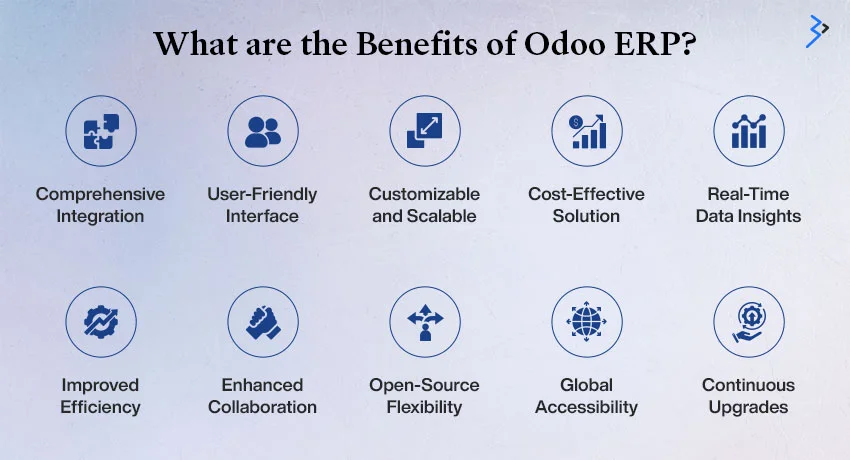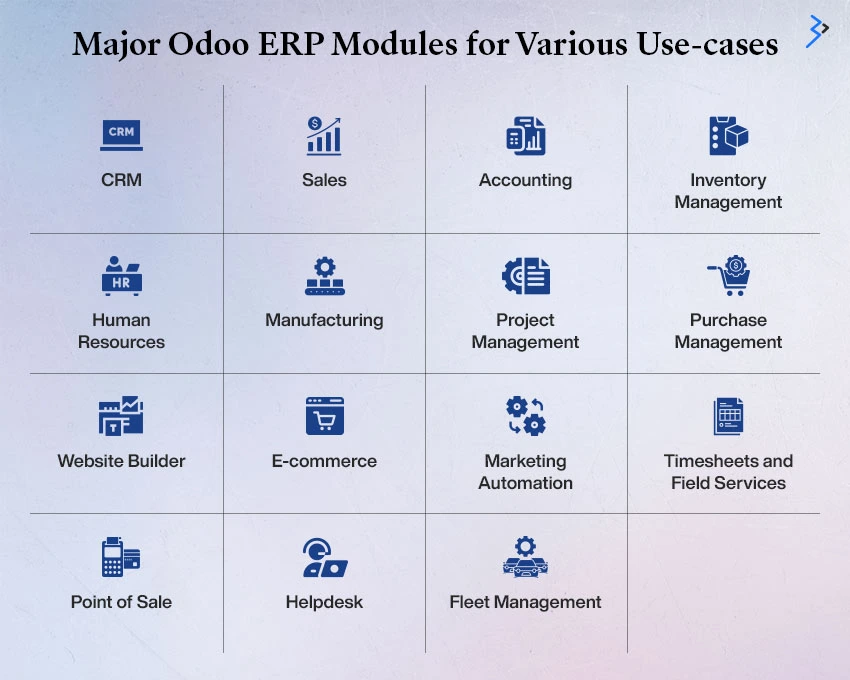Table of contents
What is Odoo ERP?
What are the Benefits of Odoo ERP
Detailed Guide to Major Odoo ERP Modules
Implementation Tips and Best Practices for Odoo ERP
Why Choose Brainvire?
In today's fast-paced business landscape, staying competitive requires robust tools that streamline operations and drive efficiency. Enter Odoo ERP—an all-encompassing enterprise resource planning software that has become a cornerstone for businesses across industries.
Odoo ERP is celebrated for its modular design, user-friendly interface, and scalability. From managing sales and inventory to accounting and HR, Odoo offers a comprehensive suite of applications tailored to meet diverse business requirements. As companies grapple with growing complexities, ERP systems like Odoo play a vital role in integrating processes, improving decision-making, and enhancing overall productivity.
This blog is your complete guide to Odoo modules. It dives deep into its history, features, and how its various modules can transform your business operations.
What is Odoo ERP?
History and Evolution
Odoo began its journey in 2005 under the name "Tiny ERP." Over the years, it has become one of the most comprehensive open-source ERP solutions. By 2010, it rebranded as OpenERP and eventually settled on Odoo in 2014. Fast-forward to 2024, and Odoo boasts over 7 million users worldwide, making it a dominant player in the ERP market.
Odoo has continually adapted to industry demands, offering over 30,000 modules that cater to businesses of all sizes. Its open-source nature allows developers to create custom applications, contributing to widespread adoption across industries.
What are the Benefits of Odoo ERP
- Cost-Effectiveness
One of the standout advantages of Odoo ERP is its cost-effectiveness, making it a viable option for businesses of all sizes. Odoo offers two versions:
- Community Version (Free): Ideal for startups and small businesses, the community version provides robust ERP capabilities without any licensing costs. It enables companies to get started without significant financial commitments.
- Enterprise Version (Paid): Tailored for medium to large enterprises, the enterprise version includes advanced features, regular updates, and dedicated support. The flexibility to choose between these versions allows businesses to optimize costs based on their requirements.
Odoo's pricing structure eliminates the need for hefty upfront investments typical of traditional ERP systems, making it a practical choice for companies looking to balance quality and affordability.
- Scalability
Odoo ERP is designed to grow alongside your business. Its modular structure ensures you can seamlessly add new modules to address emerging needs as your operations expand. For example:
- A small business may start with essential modules like Sales and Accounting.
- As it scales, additional modules like Inventory, HR, or Manufacturing can be integrated without disrupting existing workflows.
This scalability ensures businesses stay within their ERP solution, allowing them to remain agile and adapt to changing market demands.
- Ease of Use
Odoo's user-centric design makes it one of the most accessible ERP systems. Its interface is intuitive and streamlined, ensuring that even non-technical users can easily navigate the platform. Key features include:
- Simplified Dashboards: Provide users with a clear view of KPIs, reports, and actionable insights.
- Drag-and-Drop Functionality: Speeds up tasks such as project management or workflow adjustments.
- Customization Options: Businesses can personalize the interface, ensuring employees work with tools tailored to their roles.
This ease of use reduces training time and boosts adoption rates, ensuring businesses quickly realize Odoo ERP's benefits.
-
Integration
Odoo ERP stands out for its seamless integration capabilities. All modules within Odoo are designed to work together, sharing data effortlessly and creating unified workflows. Key advantages include:
- Real-Time Data Sharing: Ensures that information is instantly updated across departments, reducing errors and improving collaboration.
- Eliminating Silos: With integrated modules, departments like Sales, Inventory, and Accounting operate as a cohesive unit, enhancing overall efficiency.
- Third-Party Integrations: Besides Odoo's ecosystem, the platform integrates with popular tools such as payment gateways, eCommerce platforms, and marketing automation tools, further expanding its functionality.
This integration empowers businesses to manage operations holistically, streamlining processes and fostering data-driven decision-making.
Read More-: Advantages of Odoo ERP Implementation in Trading Business
Odoo vs. Other ERP Systems
While competitors like SAP and Oracle dominate the high-end market, Odoo's affordability and customization options make it a strong contender for small and medium-sized enterprises (SMEs). Unlike traditional ERP systems, Odoo's modular design ensures businesses only pay for what they need, making it a flexible and cost-effective choice.
Core Odoo ERP Modules Overview
Modular Structure
One of Odoo's standout features is its modular approach. Businesses can start with a few essential modules and expand as their needs grow.
Categories of Modules
- Core Modules: Essential for basic business operations (e.g., Sales, Inventory, Accounting).
- Business-Specific Modules: Tailored for unique industries like healthcare, retail, or manufacturing.
- Integration Modules: Enhance interoperability with third-party tools and platforms.
Read More-: How do you Choose the Ideal Odoo ERP implementation partner
Detailed Guide to Major Odoo ERP Modules
- Sales and CRM Modules
Key Features
Odoo's Sales and CRM modules offer a comprehensive suite of tools for effectively managing and optimizing sales pipelines and customer relations.
- Pipeline Management and Lead Tracking: Visualize and organize leads as they move through the sales funnel, helping teams prioritize and nurture potential customers.
- Automated Quotations and Invoicing: Save time with automated generation of quotations and invoices, ensuring accuracy and consistency.
- Comprehensive Reporting Tools for Sales Performance: Access insightful dashboards and reports that provide an overview of sales metrics, helping teams make data-driven decisions.
Benefits
- Streamlines the Sales Cycle: Automates processes from lead generation to deal closure, reducing manual effort and improving response times.
- Enhances Customer Relationship Management: Centralized customer data and detailed insights allow teams to personalize interactions and build stronger relationships.
Use Case
A retail company experienced a 30% increase in sales efficiency after implementing Odoo CRM. Automated lead scoring prioritized high-value opportunities, while follow-up features ensured no client inquiries were missed, leading to faster deal closures and higher customer satisfaction.
- Inventory Management
Overview
The Inventory module in Odoo provides businesses with powerful tools to manage stock levels, track product movements, and streamline warehouse operations. Its flexibility supports inventory processes, from simple stock tracking to complex multi-warehouse logistics.
Integration
This module integrates seamlessly with Sales, Purchasing, and Manufacturing, enabling a unified workflow. For instance, when a sale is made, inventory levels are automatically updated, and replenishment orders can be triggered through the Purchasing module.
Use Case
An eCommerce business reduced stockouts by 40% after adopting Odoo's Inventory module. Real-time tracking allowed the company to monitor inventory levels accurately, while automated reordering ensured optimal stock levels, improving customer satisfaction and reducing lost sales.
- Accounting & Finance
Features
Odoo's Accounting module simplifies financial management with a range of features tailored to diverse business needs:
- Invoicing and Payment Tracking: This system automates the creation and management of invoices, reducing errors and improving cash flow visibility.
- Financial Reporting and Compliance Tools: Provides detailed financial statements and ensures adherence to local regulations.
- Bank Reconciliation and Expense Management: Streamlines processes like bank statement imports and expense tracking, saving valuable time.
Benefits
- Improves Financial Transparency: Centralized financial data offers clear insights into a company's financial health.
- Simplifies Complex Accounting Processes: Automation reduces manual effort, freeing finance teams to focus on strategic planning.
Example
A service-based company saved over 15 hours weekly by using Odoo's Accounting module. Automated invoicing and payment reminders minimized manual input, while financial reports provided instant clarity on revenue and expenses, enhancing decision-making.
- Human Resources (HR) Module
Features
The HR module in Odoo provides end-to-end management of the employee lifecycle, enhancing efficiency and workforce engagement:
- Recruitment and Onboarding Workflows: Streamlined applicant tracking and onboarding processes ensure a seamless transition for new hires.
- Payroll Management: Handles payroll calculations, tax deductions, and compliance, ensuring accuracy and timeliness.
- Employee Performance Tracking and Appraisal Systems: Enables managers to set goals, track performance, and conduct appraisals effectively.
Benefits
- Enhances Workforce Management: Provides tools to manage recruitment, performance, and payroll in a single platform, reducing administrative overhead.
- Automates Repetitive Tasks: Frees HR teams to focus on strategic initiatives like talent development and retention.
Scenario
A mid-sized IT firm reduced recruitment time by 20% using Odoo HR. The automated applicant tracking system streamlined resume sorting, interview scheduling, and feedback collection, enabling the HR team to fill positions faster.
- Manufacturing (MRP)
Features
Odoo's Manufacturing (MRP) module is designed to optimize production processes with features such as:
- Production Planning and Scheduling: Helps manufacturers allocate resources effectively and meet deadlines.
- Bill of Materials (BoM) Management: Simplifies the creation and tracking of BoMs for complex products.
- Quality Control and Traceability: Ensures product quality and compliance through integrated quality checks and traceability.
- eCommerce Module
The eCommerce module in Odoo empowers businesses to create and manage their online stores effectively. Key features include:
- Online Store Setup with Product Catalogs: Offers customizable templates and tools to showcase products attractively.
- Payment Gateway Integration: Supports various payment methods, ensuring smooth customer transactions.
- Customer Portal: This enables buyers to track orders, download invoices, and access support.
Read More-: Business Intelligence and Data Analytics Features of Odoo ERP
Importance
In today's digital era, having an eCommerce presence is critical for business growth. Odoo's integrated approach allows businesses to sync inventory, sales, and marketing efforts seamlessly.
Example
A fashion retailer doubled its online sales in six months by leveraging Odoo's eCommerce module. Integrating inventory and marketing tools ensured accurate stock updates and targeted promotions, creating a smooth customer shopping experience.
- Project Management
Features
Odoo's Project Management module is a versatile tool for planning, tracking, and completing projects on time:
- Task and Milestone Tracking: Assign and monitor tasks with clear milestones and deadlines.
- Gantt Charts and Calendar Views: Visualize project timelines for better planning and resource allocation.
- Time Tracking for Project Billing: Automatically track billable hours and generate accurate invoices.
Role
This module fosters team collaboration, ensures projects stay on schedule, and provides a clear overview of project progress.
Example:
A marketing agency improved project turnaround times by 15% using Odoo's Project Management dashboard. The centralized system allowed teams to communicate effectively, track real-time progress, and proactively address bottlenecks, ensuring timely campaign delivery.
Industry-Specific Modules
Odoo also offers tailored modules for industries such as:
- Healthcare: Patient management, appointment scheduling.
- Retail: POS systems, inventory tracking.
- Education: Student management, course scheduling.
Customization ensures businesses can adapt Odoo to their unique operational requirements.
Integrating Odoo Modules
Odoo modules are designed to work together seamlessly, ensuring:
- Unified workflows
- Real-time data sharing across departments
- Enhanced productivity and decision-making
For example, integrating Sales, Inventory, and Accounting modules ensures smooth order processing and accurate financial reporting.
Read More-: Odoo VoIP Everything You Need to Know
Customization and Flexibility
Odoo's open-source nature allows for extensive customization to meet specific business needs.
Example
A logistics company customized Odoo to include route optimization and fleet tracking, significantly improving delivery times.
Implementation Tips and Best Practices for Odoo ERP
Implementing Odoo ERP can transform your business operations, but success depends on a strategic and thoughtful approach. Below are some detailed tips and best practices to ensure a smooth and effective implementation:
- Define Objectives
Before implementing Odoo ERP, identify your business objectives and the specific outcomes you want to achieve. This clarity will help you select the correct modules and customization options to meet your needs.
- Evaluate Pain Points: Identify challenges in current workflows, such as inefficiencies in inventory management or delays in invoicing.
- Set Measurable Goals: Establish KPIs, such as a percentage reduction in manual tasks, faster order processing, or increased sales conversions.
- Align Objectives Across Teams: Ensure all departments agree on priorities and expected benefits to avoid conflicting goals.
Example
A wholesale distributor aimed to improve inventory accuracy and reduce order fulfillment times. By defining these objectives upfront, they successfully implemented Odoo's Inventory and Sales modules to streamline their operations.
- Start Small
While Odoo's modular structure allows you to implement various features, starting with the most critical modules for your business is best. Gradual expansion helps manage the learning curve and ensures stable operations during the transition.
- Focus on High-Impact Areas: To address pressing business needs, start with modules like Sales, CRM, or Accounting.
- Test Before Scaling: Pilot the implementation in a single department or location before rolling it out across the organization.
- Gather Feedback: Use initial implementation insights to refine the process for subsequent module rollouts.
Example
A manufacturing firm started with the Manufacturing (MRP) and Inventory modules to optimize production. Once stable, they added Accounting and HR modules to manage financials and workforce effectively.
- Choose the Right Partner
Collaborating with an experienced Odoo implementation partner can significantly improve the impact of the project's success. Skilled partners bring technical expertise, industry knowledge, and a proven methodology.
- Assess Partner Expertise: Look for partners with experience in your industry and a history of successful Odoo implementations.
- Leverage Customization Skills: Choose a partner to tailor Odoo modules to your unique business needs.
- Ongoing Support: Ensure the partner offers post-implementation support for troubleshooting and optimization.
- Train Your Team
ERP systems can only succeed with user adoption. Proper training ensures employees understand how to use Odoo effectively, improving utilization and productivity.
- Customized Training: Tailor training sessions to specific roles, such as sales, finance, or inventory management, so employees learn the features most relevant to them.
- Hands-On Practice: Provide access to a test environment where users can explore features and familiarize themselves without affecting live data.
- Ongoing Support: Create a system for addressing user queries and conducting periodic refresher training as new modules are added.
Example
A retail chain trained its sales team on Odoo's POS and Inventory modules. The hands-on sessions enabled staff to handle transactions seamlessly and manage stock levels in real-time, boosting efficiency.
- Monitor Progress
Implementing Odoo is a task that requires continuous monitoring and refinement to align with evolving business needs.
- Track KPIs: Measure progress against initially defined goals, such as improved order processing times or reduced inventory discrepancies.
- Gather Feedback: Regularly seek employee input using the system to identify challenges and improvement areas.
- Optimize Modules: Use insights to fine-tune workflows, automate repetitive tasks, and enhance module configurations.
Example
An eCommerce company monitored its KPIs after implementing Odoo's eCommerce and Inventory modules. Real-time data analysis revealed areas for improvement, leading to better stock management and faster order delivery.
Key Takeaways
Odoo ERP is a game-changer for businesses seeking an affordable, flexible, and comprehensive ERP solution. Its modular design ensures scalability, while its integration capabilities streamline department operations.
Why Choose Brainvire?
As an Odoo Gold Partner, Brainvire implements and customizes Odoo solutions tailored to your business needs. Let us help you unlock the full potential of Odoo ERP.
Ready to transform your business? Contact us today to learn more about our Odoo services.
Related Articles
Digital Transformation
AEM Implementation Cost Insight: Everything You Need to Know
Digital Transformation
AEM Implementation Process, Best Practices, and Tips
Digital Transformation
Odoo Pricing Guide: A Comprehensive Breakdown



